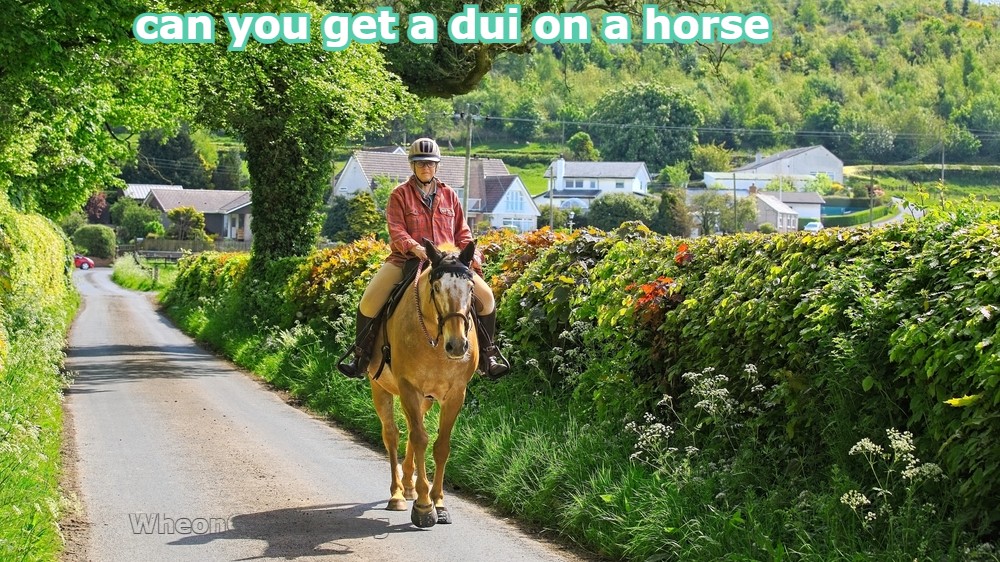Introduction
When you think of a DUI (Driving Under the Influence), you likely envision someone behind the wheel of a car or operating a motorized vehicle. It might surprise you to learn that DUI laws can extend beyond vehicles like cars, trucks, and motorcycles. This brings up a very interesting question: Can you get a DUI on a horse? After all, horses have been used for centuries as a primary means of transportation, and they are still a popular mode of travel in certain areas.
However, modern DUI laws are designed to keep the public safe from impaired individuals, no matter how they are getting around. This article dives deep into the unexpected intersection of DUI laws and horseback riding, answering your questions and providing insights into how riding a horse under the influence may be treated in your jurisdiction.
What Exactly is a DUI?

To understand if you can get a Can You Get a DUI on a Horse, it’s important to first know what a DUI is. DUI stands for “Driving Under the Influence.” This term refers to operating any vehicle (typically a motor vehicle) while impaired by alcohol, drugs, or other substances.
Driving under the influence is illegal because it poses a significant risk to the driver, passengers, pedestrians, and other drivers. DUI laws are in place to deter impaired operation of vehicles, protect the public, and maintain order on the roads.
Can You Get a DUI on a Horse?
Yes, it is possible to get a Can You Get a DUI on a Horse, though it depends on where you are. The laws vary between different states and countries, but in many places, you can be charged with a DUI if you’re riding a horse under the influence of alcohol or drugs.
The reasoning behind this is the same as for motor vehicles: riding a horse while intoxicated can impair your ability to control the animal, leading to potential danger for both you and others around you. In fact, in some jurisdictions, horses are classified as “vehicles” in DUI statutes, making it illegal to ride one while impaired.
Why Are DUI Laws Extended to Horses?
The primary reason DUI laws apply to horseback riding is safety. Even though a horse is not a motorized vehicle, it is still a form of transportation, and controlling a horse requires coordination and focus. If you’re under the influence of alcohol or drugs, your ability to control the horse diminishes, just as your ability to drive a car safely does.
A drunk or impaired rider could cause accidents, hurt the horse, or pose a risk to pedestrians or other animals. Because of this, some laws extend DUI charges to horseback riders to ensure public safety.
Are Horses Considered Vehicles Under DUI Laws?
In some legal systems, horses are classified as “vehicles” under DUI laws. A vehicle doesn’t always have to be a motorized machine; it can refer to any transportation used to carry a person from one place to another. Because horses are still used for transportation in many areas, especially in rural regions or equestrian communities, they can fall under the same category as cars, bicycles, or horse-drawn carriages.
In these jurisdictions, if you’re riding a horse on public roads or public property, you might face DUI charges just as you would if you were driving a car while intoxicated.
Can You Get a DUI on a Horse on Private Property?
While DUI laws typically apply to public spaces and public roads, the situation becomes murkier when riding on private property. In general, if you’re on private land and not in public view, you may not face the same DUI penalties. However, it’s important to understand that some areas have laws that still apply to private property.
If you’re riding on private land and endangering others (such as trespassing onto public land or creating a dangerous situation), you could still be charged with DUI or other offenses like reckless endangerment or public intoxication.
What Happens If You Get a DUI on a Horse?
Getting a DUI while riding a horse can carry serious consequences. If you’re caught riding a horse under the influence, you could be subjected to the same penalties as if you were caught driving a car under the influence. These penalties might include fines, license suspension (even though you’re not driving a car), mandatory DUI education, community service, and even jail time.
In some cases, the horse could be impounded, and you may face additional charges if your actions harm the animal or others around you.
Are DUI Penalties for Horses the Same as Motor Vehicles?
The penalties for Can You Get a DUI on a Horse can vary based on where you are, but in many places, the penalties are similar to those for DUI in a motorized vehicle. This includes hefty fines, mandatory DUI courses, potential license suspension, and other legal consequences. However, the severity of the penalty may depend on your blood alcohol content (BAC), whether the horse is harmed, and whether you caused an accident.
In rural areas or places where horses are a more common mode of transportation, the penalties may be less severe, but the law is still clear: it is illegal to operate any form of transportation, including a horse, while impaired.
Can You Drink and Ride a Horse in a Rural Area?

Rural areas may have fewer regulations surrounding horseback riding, but that doesn’t mean you’re exempt from DUI laws. Rural areas with more horse-drawn carriages or horseback riders may still impose DUI charges to prevent impaired riding.
Riding under the influence, whether in a city or on a rural trail, still presents safety risks, and law enforcement in rural areas may take DUI violations seriously if the rider is deemed to be endangering the public or the horse. It’s essential to be aware of the laws in your area before deciding to drink and ride.
What to Expect if You Are Pulled Over Riding a Horse
If you’re riding a horse and a law enforcement officer believes you’re under the influence, they have the right to pull you over or stop you for a field sobriety test. If you’re unable to maintain control of the horse, are visibly impaired, or break any public safety laws, the officer can charge you with DUI or other offenses.
You might also be required to take a breathalyzer test or field sobriety tests, just as you would if you were driving a car. In some jurisdictions, a Can You Get a DUI on a Horse may be treated with less severity, but the officer can still issue citations and penalties based on the circumstances.
Can You Be Charged With Other Offenses While Riding a Horse?
In addition to DUI charges, other offenses could be levied if you are caught riding a horse under the influence. For example, charges like public intoxication, reckless endangerment, or even animal cruelty could be applied depending on the situation.
If the horse is harmed due to your impairment, you could face animal cruelty charges. If you endanger others while riding, reckless driving or endangerment charges could apply. These additional charges can increase your legal troubles beyond just a DUI.
Tips to Stay Safe While Riding a Horse
The best way to avoid the risk of getting a Can You Get a DUI on a Horse is simply to stay sober. Just like driving a car, riding a horse requires full attention and coordination, which can be seriously impaired by alcohol or drugs. If you plan to ride, make sure you’re fully in control of the horse and able to act safely.
Always stay sober when operating any vehicle, including a horse, and be aware of the local laws regarding DUI and horseback riding.
Conclusion
While it might seem unusual, you can get a DUI on a horse in certain places, and the penalties can be severe. DUI laws exist to protect everyone, whether they’re in a car, on a bicycle, or riding a horse. Riding under the influence of alcohol or drugs poses a risk to yourself, your horse, and the public.
It’s essential to understand the laws in your area and always ride responsibly. Make sure to stay sober if you’re planning to take a horseback ride, and remember that your safety is paramount, whether you’re in a car or on horseback.














Leave a Reply